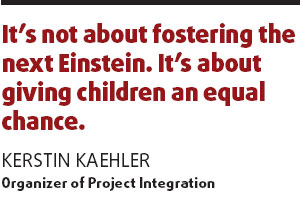Sweet charity
SHANGHAI: If charity makes you think of sleepy old women selling homemade cupcakes at a local bazaar, think again. Shanghai's expat community is a whole lot more inventive than that. The most recent example of reaching out in an "untraditional" way is the hunks at a local expatriate rugby club, who have just stripped off for a picture calendar - all in the name of charity.
|
More and more expats are becoming active in China's charities, such as Kerstin Kaehler, who is the main organizer of Project Integration, and The Guinness Shanghai Hairy Crabs Rugby |
More expats are involved in China's charities than ever before and the people involved are as diversified as are the numerous good causes they support.
The expats stretch from the rugby players donating through pictures of their nude bodies to businesswomen who have found a good alternative to giving to the professional beggars on the street.
The personal growth derived from giving something back to the community acts a huge incentive for these foreigners.
Although charity is a serious business, some have succeeded in making it fun as well. Such a bunch is the blokes from The Guinness Shanghai Hairy Crabs Rugby Team, who have just appeared a nude calendar.
Photographed by Scott Wright from Limelight Studios, the calendar features the players in daring yet stylish shots.
Proceeds go to Xin Xing Aid for Street Kids (ASK), a Chinese NGO for street children providing medical, educational, family and psychological support in a 24-hour center for children aged 6 to 18 years. It is based in Baoji, Northwest China's Shaanxi Province.
Although posing for the shoot required persuasion from Shane Benis, who is responsible for the calendar, almost everybody had a laugh at their own expense.
"Basically, everybody took it with the special rugby mentality of sure, why not help," says Benis, who had already stripped for charity while at university.
"The funny thing was to see the guys' reactions as they found their own pictures to be surprisingly nice looking."
The team, consisting of Englishmen, French and New Zealanders, chose to strip for charity instead of donating money because "it would not have been the same".
While the calendar will attract publicity for the club, Benis underlined that the main incentive was to provide help for children who need it.
Dane Mette Overgaard is also trying to make a difference. She started four months after moving to Shanghai in the autumn of 2006.

After returning from a lunch with other female expats, Overgaard said she "felt frustrated". She typed in the words "volunteer work Shanghai" and found the website of Shanghai Sunrise, which sponsors students' education. Since then, Overgaard has become the coordinator of the organization's Student Life Skills Program.
Before moving to China, Overgaard held down a busy career as an Executive PA and was relieved when she relocated to Shanghai with her husband. However, expat life in the big city was not fulfilling.
"I had a lot to give, yet at that point I was only giving to myself," Overgaard says. She soon began immersing herself in language studies and Chinese culture. Later, she looked to charities as a way of contributing to her new home.
At Shanghai Sunrise, her job is to help companies allocate funds set aside for corporate social responsibility (CRS). Her expertise is in helping these companies aware of the needs of the students her organization helps.
"To help out gives me a kick," Overgaard says. "Donating money, as much as it is needed, would not be the right solution for me."
Shanghai Sunrise, which is registered with the Shanghai Charity Foundation, provides scholarships for 759 students, half of whom are in high school. And 329 sponsors make their work possible.
In the eyes of Overgaard, the dedication of the staff is overwhelming, considering that they do not get paid for it.
One of the students for whom Shanghai Sunrise has made a difference is Cai Danping. Growing up in suburban Shanghai, Cai's childhood was very tough. With her mother imprisoned for murdering her abusive father, the young girl and her sister were left to take care of themselves.
In 1999, when one of Shanghai Sunrise's sponsors heard about Cai's struggle, she decided to help the girl and her sister, enabling her to finish 9th grade Longxia Middle School, and continue her studies at Jinwei High School and Shanghai Finance University.
Today, Cai works full time as an Administrative Assistant at Shanghai Sunrise, because she is professionally devoted to the foundation that changed her life.
According to Cai, if she had not received assistance in getting an education, she would be working in a factory now, like her former fellow classmates.
"Shanghai Sunrise helped me both financially and emotionally," Cai says.
German Kerstin Kaehler is another expatriate who is dedicated to giving something back to China. She is the main organizer of Project Integration, a group dedicated to changing the future of migrant children by funding their schooling.
"It's not about fostering the next Einstein," she says. "It's about giving children an equal chance."
Kaehler's work for Project Integration was recently acknowledged at the Shanghai Expatriate Professional Women's Society Businesswoman Award. In March 2007, she won the award for Societal Contribution.
As a growing number of migrant workers come from other provinces to look for work in the big cities, more than 500,000 children of migrant parents are estimated to be living in the greater Shanghai area. But with a relatively low income, migrant parents sometimes find themselves without means to pay for their children's educations.
|
Team, who have just appeared a nude calendar for charity.File photos |
According to Kaehler, the average tuition fee per semester is 700 yuan to 800 yuan ($93.7-107), while the average income of migrant families ranges between 500 and 1,000 yuan ($66.9-133.9) a month.
Project Integration was founded in 1998 by Dr Sabine Rudischhauser, and Kaehler joined in 2003. It started out supporting 25 children and now supports 221.
"Migrant parents often wish for a better future for their children, but without education, that is not very likely," explains Kaehler. "To integrate them into society, they need a basic education."
Kaehler's commitment to China started in high school, after she traveled to Shanghai on an exchange program. Later, while pursuing her master's degree in Marketing, she spent two semesters in China - one in Nanchang, in East China's Jiangxi Province, at Nanchang University, and half a year in Shanghai as an intern at a German company. She moved back to China in 1999.
"This environment is allowing me to grow a lot, on a professional and personal level."
In addition to her dedication to Project Integration, Kaehler is the Office Manager at the German Center in Shanghai. She says that she first turned to charity work after encountering children begging on the street and being aware that they might be professionals or, even worse, they might be children forced to beg by adults.
"If I stay in any place long enough, I'd want to be involved in what happens there. And since I do have a talent for organization, why not use it?" Kaehler says.
(China Daily 11/02/2007 page19)
















